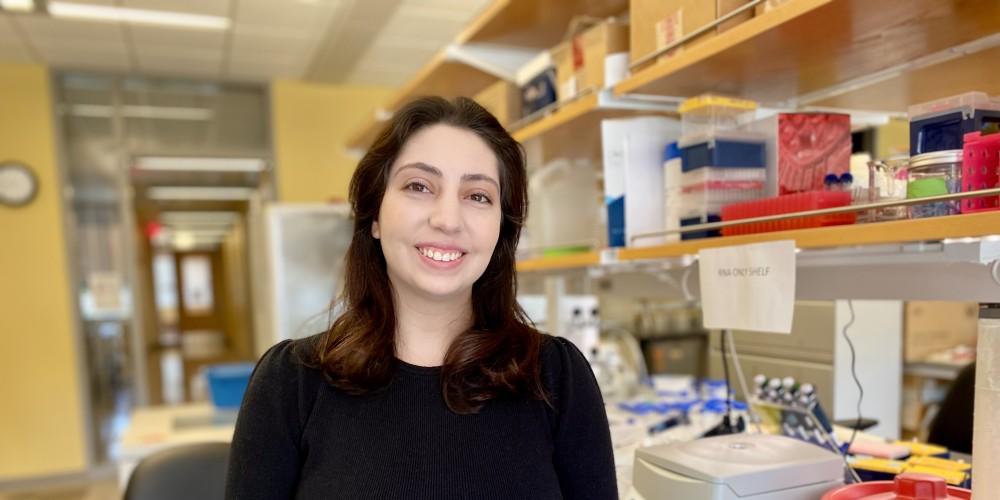Upstate grad student Aya Kobeissi wins prestigious award for her research on empathy and dementia
In recognition of academic excellence, Upstate Medical University graduate student Aya Kobeissi has been awarded the prestigious Diana Jacobs Kalman/AFAR Scholarship.
Offered by the American Federation for Aging Research (AFAR), the award honors Kobeissi’s dedication to advancing the understanding of neurological diseases, particularly behavioral variant frontotemporal dementia (bvFTD) and her commitment to improving the lives of individuals affected by such conditions.
Kobeissi, a fifth-year doctoral student working in the lab of Wei-Dong Yao, PhD, is currently studying dysfunction in the prefrontal cortex; specifically, the neural mechanisms underlying bvFTD-associated symptoms.
“We're interested in studying bvFTD,” she explains, “which is a form of dementia with a typical onset between the ages of 40 to 65.”
FTD is the second leading cause of dementia after Alzheimer's disease. One of the most distressing features exhibited by those with FTD is the loss of empathy. "They often exhibit dramatic changes in personality,” Kobeissi said. “That's arguably one of the most distressing features for the patients, as well as their caretakers and friends and family."
Kobeissi’s research works to understand how empathy-related behaviors are lost in individuals with FTD and aims to uncover the cellular and pathological mechanisms responsible for these changes. She’s investigating the potential role of oxytocin, a neuropeptide hormone regulating social bounding and behavior, in this process.
"Our preliminary data suggests that oxytocin might be involved in helping us reverse the behavioral deficits we see,” she said. “Interestingly, oxytocin has been used clinically for other reasons, one of which is to help promote social behaviors, such as with autism clinical trials. In terms of FTD, not much is known about how oxytocin can modulate empathy."
The desire to pursue a career in neurological research stems from Kobeissi’s desire to help those with untreatable neurological conditions. "My brother has very severe autism and it's hard both on him and the family, because we don't know how to help him,” she noted. “Essentially, there are not many effective treatments. I wanted to get into science to try to help contribute to the knowledge base.
“We want to know why the loss of empathy-like behaviors happens, and how can we reverse it?” she said. Using a mouse model created in collaboration with Dr. Fen-Biao Gao lab at UMass Chan Medical School, Kobeissi will be looking for mechanistic targets for future therapeutic treatments to hopefully be used in clinical trials. "We think this definitely has potential in order to help patients live better lives. Not only those with FTD, but also anyone that's suffering with similar symptoms; loss of empathy, loss of compassion towards one another."
Kobeissi’s research is an extension of Dr. Wei-Dong Yao’s current work studying empathy loss and FTD; Read more about his work here: https://www.upstate.edu/news/articles/2023/2023-07-05-dement.php

